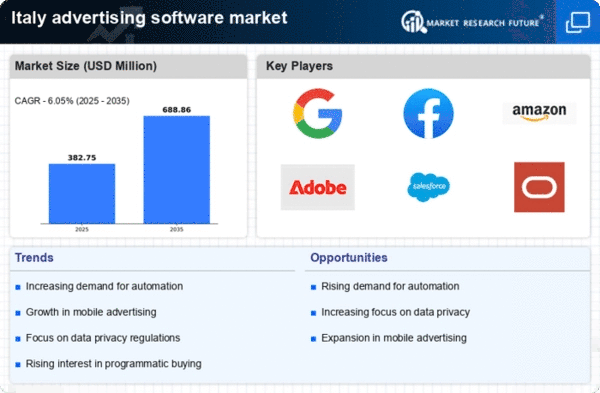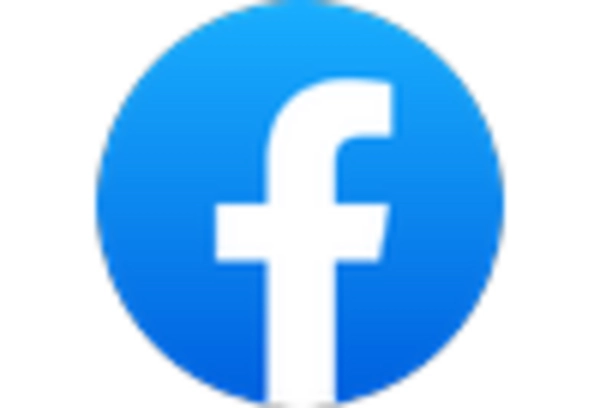Emergence of Mobile Advertising
The rise of mobile advertising is reshaping the advertising software market in Italy. With a significant portion of the population accessing the internet via mobile devices, businesses are increasingly focusing on mobile-first advertising strategies. In 2025, mobile advertising is projected to account for over 50% of total digital ad spending in Italy. This shift necessitates the development of advertising software that can effectively cater to mobile platforms, ensuring that campaigns are optimized for smaller screens and varied user experiences. As companies adapt to this mobile-centric landscape, the advertising software market is poised for growth, driven by the need for innovative solutions that enhance mobile engagement.
Expansion of E-commerce Platforms
The rapid expansion of e-commerce platforms in Italy is significantly influencing the advertising software market. With online shopping becoming a preferred choice for consumers, businesses are increasingly leveraging advertising software to promote their products and services effectively. In 2025, e-commerce sales in Italy are expected to surpass €30 billion, indicating a robust growth trajectory. This surge in online retail activity necessitates advanced advertising solutions that can facilitate targeted marketing efforts and optimize ad spend. Consequently, the advertising software market is likely to see heightened demand as companies seek to capitalize on the growing e-commerce landscape and enhance their visibility in a competitive digital environment.
Growing Importance of Personalization
Personalization has emerged as a critical driver in the advertising software market in Italy. Businesses are increasingly recognizing the value of tailored advertising experiences to enhance customer engagement and conversion rates. According to recent studies, personalized ads can lead to a 20% increase in click-through rates. As a result, companies are investing in advertising software that enables them to analyze consumer behavior and preferences, allowing for more targeted campaigns. This shift towards personalization is likely to propel the demand for innovative advertising software solutions, as firms strive to create meaningful connections with their customers and improve overall campaign effectiveness.
Rising Digital Advertising Expenditure
The advertising software market in Italy is experiencing a notable increase in digital advertising expenditure. As businesses shift their focus towards online platforms, the demand for sophisticated advertising software solutions is likely to rise. In 2025, digital ad spending in Italy is projected to reach approximately €5 billion, reflecting a growth rate of around 10% annually. This trend indicates that companies are increasingly allocating their budgets to digital channels, necessitating advanced software tools to optimize their advertising strategies. The advertising software market is thus positioned to benefit from this surge in investment, as organizations seek to enhance their online presence and engage effectively with their target audiences.
Increased Demand for Performance Measurement Tools
The advertising software market in Italy is witnessing a growing demand for performance measurement tools. As businesses strive to maximize their return on investment (ROI) from advertising campaigns, the need for robust analytics and reporting capabilities becomes paramount. Companies are increasingly seeking software solutions that provide real-time insights into campaign performance, enabling them to make data-driven decisions. In 2025, it is estimated that around 70% of advertisers in Italy will prioritize performance measurement tools in their advertising strategies. This trend indicates a shift towards accountability and transparency in advertising, driving the growth of the advertising software market as firms invest in technologies that enhance their ability to track and optimize campaign outcomes.
















